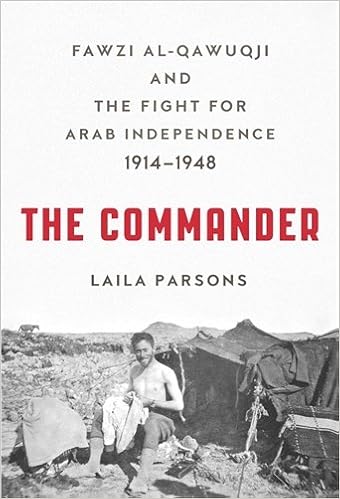
This book doesn't grab you immediately, but gradually the information Parsons delivers in her straightforward clear style begins to form a critical story. For many of us who are too lazy to actually learn why the Middle East has become such a nidus of tragedy, this book is a gift. By laying the track of Fawzi al-Qawuqji's military adventures and misadventures throughout that region over half of the twentieth century, Parson provides guidance for understanding how those early critical events are key to comprehending the present.
I had already known that the blundering partition of the Arab nations by the British and French after the First World War had set this hellish ball rolling, but I hadn't realized the full craziness of their last attempts to regain colonial nirvana. The subsequent resistance by Qawuqji and his colleagues against the European presence was obstructed by their own changing alliances as they wrestled with the continual question of whether the outcome should be a unified Arab state or individual nations. Qawuqji's own alternating roles as major player, scapegoat, and victim reflected the chaotic shifts of loyalty within the perilous Arab power structure and to the Europeans as well. The establishment of the Israeli state and Qawuqji's failed attempt to lead a small ill-equipped army against it was the final step in destroying any ambitions for an Arab state. The fractured nations that emerged from these conflicts still carry unhealed wounds.
Of some interest, having the book on Kindle allowed me to search for the terms "Muslim", which had 35 mentions, and "Islam", which had only 34. The early fight against the European masters and Israel was nationalistic, not religious. The only ominous hint of this current terrible trend was a brief mention of Wahhabism, an austere and strict practice by Sunni Muslims in the Nejd region located in Saudi Arabia, which later fed the beliefs of those in Al Qaeda and ISIL. At the time it was a small rural cult that played no role at all in the mid 20th century struggles or in the thinking of those who were fighting for Arab autonomy during this period. I hope Parsons has another book in mind for tracking this particular tough story.
In the meantime, I'm grateful for this book. I think it's important; it uses an interesting and compelling story of a flawed leader in a flawed situation to explain how the Middle East disaster evolved, who the original villains really were, and why our own intrusion into this part of the world was yet another iteration of the original awful blunder.
No comments:
Post a Comment